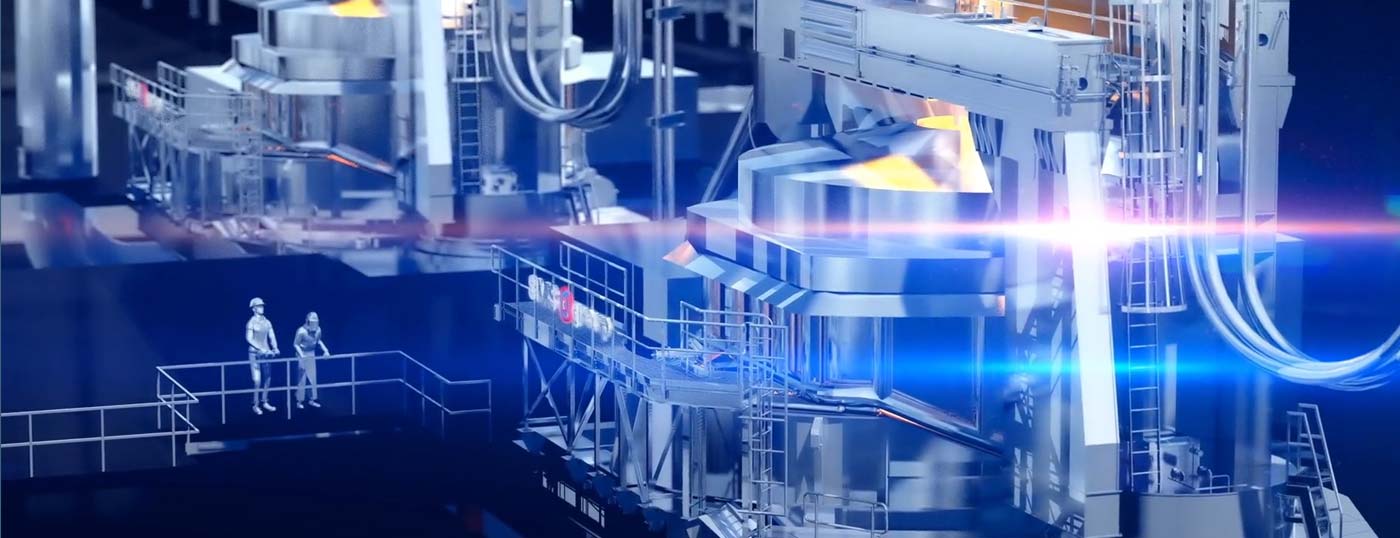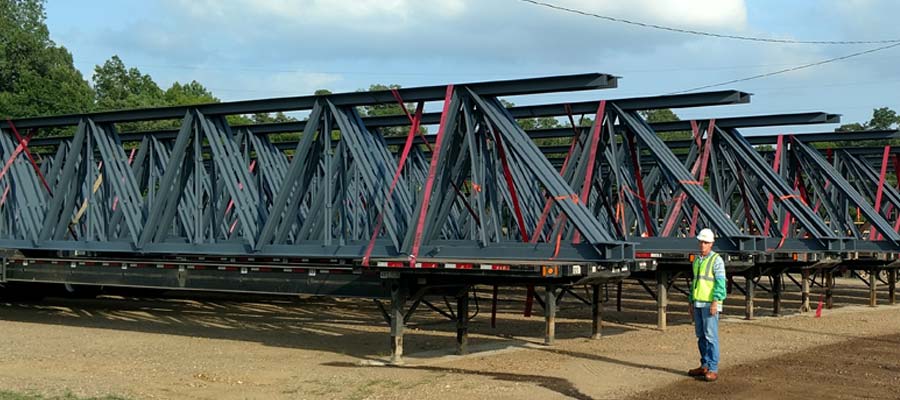
This will be the most technologically advanced steel mill in the country and the largest project Steel Dynamics Inc. has ever undertaken. The new $1.9 billion state-of-the-art electric-arc-furnace (EAF) flat roll steel mill in Sinton, Texas, features New Millennium Building Systems steel joists, joist girders and steel roof deck.
SDI, parent company of New Millennium based in Fort Wayne, Ind., selected the small town of Sinton because of its proximity to the deep-water Port of Corpus Christi, railroads, an extensive highway system, and market reach to the four-state Texas area, the Western U.S. and Mexico.
“We have been developing a flat roll steel business strategy for this region and Mexico for several years,” says Mark Millett, SDI president and chief executive officer. “Our planned new EAF flat roll steel mill will be the most technologically advanced facility existing today. Our team has selected a suite of technologies based on our proven history of success, that should allow us to achieve steel grades previously out of reach to thin-slab casting technology while sustaining the low-energy and low-carbon footprint that is at the core of our steelmaking operations.”
The steel mill will be a campus of buildings that will occupy 1,000 acres of the 2,500 acres associated with the project, with much of the land unoccupied to act as a buffer to surrounding areas. The facility features coating lines, a cold mill, a hot mill, a melt shop, an administration building and a cafeteria, among others.
Loading the player...
New Millennium is supplying joists and joist girders for the cold mill, hot mill and melt shop as well as B deck roof deck for the melt shop. The joists and roof deck are relatively standard, says New Millennium engineering manager Brady Broom, but the girders are a different story. Their lengths range from 60 to 120 feet in the cold mill to 126 feet in the hot mill and 128 feet in the melt shop; depths range from 4 feet to 14 feet, 8 inches.
The SDI project is big, not only in scale but volume. New Millennium is producing hundreds of girders and thousands of joists for the three structures. Brady estimates 230 girders are required for the cold mill, 130 for the hot mill and 100 for the melt shop so far (project is not yet complete).
Multiple New Millennium plants participated in the fabrication process, which makes delivery and sequencing a challenge, as the products must arrive in Sinton precisely when needed. Broom says the process requires significant coordination with the erector, who is panelizing the joists on the ground before using a crane to fly them into place on the steel frame.
“We had to figure out what worked the best to get product to them when they needed it and still keep everybody else happy,” he says.
Generally, each delivery truck’s stretch trailer can hold two girders. With almost 500 girders to deliver, the scope of coordination required quickly reveals itself.
Broom says there are some particularly “giant” joist girders for the melt shop that will be supporting the loads of 24-foot diameter exhaust ducts on the roof. Also factored into their design are the wind load requirements in the Corpus Christi area.

Brady and his team of draftsmen, designers and engineers have been working closely with CSD Structural Engineers to ensure proper design of the joists and joist girders to meet the various loading requirements and streamline production. Early up-front collaboration on these decisions has expedited the design process. When open communication is available with the design team, New Millennium can provide this service to our customers to save days or weeks that can be consumed during the request-for-information process.
CSD and New Millennium communicated quickly, clearly and often, Brady says.
“In order to get all of our questions answered, we make a lot of phone calls and e-mails to get the drawings finalized before we go out for approval,” he says. “They return the drawings to us, and we begin production. It’s very efficient.”
When complete sometime in the middle of 2021, the steel mill complex is expected to create about 600 jobs and also generate indirect job growth among customers and other support service providers. Already, South Carolina-based JM Steel has announced it will establish a “colocation” on the SDI campus that will employ about 50 people.
“We are eager to join the Sinton community, and we appreciate the warm welcome and support that we have received from them, Gov. (Greg) Abbott and the State of Texas, as well as local leaders from San Patricio County, the City of Sinton and the Sinton Independent School Board,” Millett says. “We thank them for their trust, shared vision and support for this important strategic investment.”
“This is a wonderful employer that will have a major positive impact that will be felt throughout the region,” says Iain Vasey, president and CEO of the Corpus Christi Regional Economic Development Corporation.
For SDI, the facility is expected to have an annual production capacity of approximately 3 million tons with the capability to produce the latest generation of Advanced High Strength Steel grades. The project will feature value-added finishing lines, including a galvanizing line with an annual capacity of 550,000 tons, and a paint line with an annual coating capacity of 250,000 tons. Collectively, the complex will produce various flat-roll steel products, including hot-roll, cold-roll, galvanized, Galvalume® and painted steel, primarily serving the energy, automotive, construction and appliance sectors.
Building a better steel experience